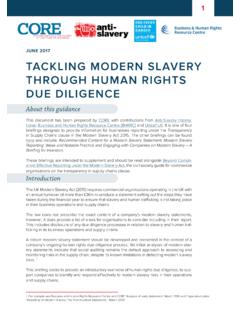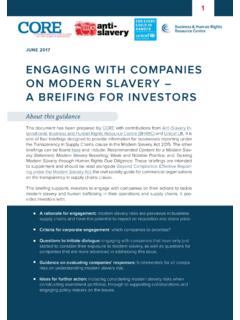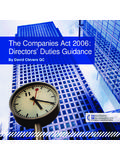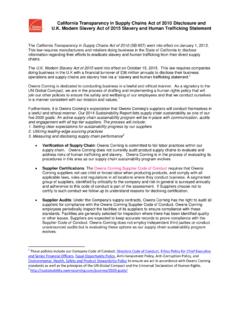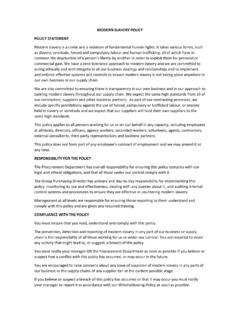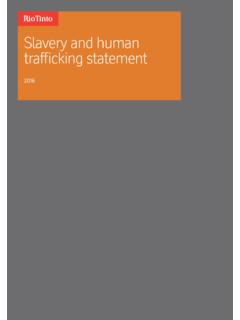Transcription of RECOMMENDED CONTENT FOR A MODERN …
1 RECOMMENDED CONTENT FOR A MODERN slavery STATEMENT1 IntroductionSection 54 of the UK MODERN slavery Act (2015) requires commercial organisations operating in the UK with an annual turnover in excess of 36m to produce a slavery and human trafficking statement for each financial year of the organisation .The Act specifies two legal requirements for statements:Companies that do not meet these basic requirements are breaking the must be published on the organi-sation s UK website with a link in a prominent place on the UK homepage. The emphasis on visibility is intended to enhance reporting standards, encouraging companies to publicly demonstrate their commitment to addressing MODERN slavery .
2 Statement should be approved by the board or directors and signed by a director. This as-signs ownership to senior level management and encourages their proactive involvement in tackling abusive practices in business opera-tions. 121 About this guidanceThis document has been prepared by CORE with contributions from Anti- slavery International, Business and Human Rights Resource Centre (BHRRC) and Unicef UK. It is one of four briefings designed to provide information for business on reporting under the Transparency in Supply Chains clause in the MODERN Slav-ery Act 2015.
3 The other briefings can be found here and include: Engaging with Companies on MODERN slavery A Breifing for Investors; MODERN slavery Reporting: Weak and Notable Practice; and Tackling MODERN slavery through Human Rights Due Diligence. These briefings are intended to supplement and should be read alongside Beyond Compliance: Effective Reporting under the MODERN slavery Act, the civil society guide for commercial organisations on the transparency in supply chains clause. The slavery and Human Trafficking Statement: Legal RequirementsJUNE 2017 Reporting under the Act should seek to foster a better understanding of the company, its reach and the steps it takes to minimise the risk of slavery occurring in its operations and supply chains.
4 Companies that do not provide this information are more likely to face greater scrutiny from investors, NGOs, customers, business partners and public contracting company s slavery and human trafficking statement should make clear its commitment to tackling MODERN slavery , and substantiate this by documenting its risk-mapping processes, relevant policies, training procedures, action plans, and engagement stakeholders including workers, NGOs and trade unions. MODERN slavery prevention should be considered as part of a broader human rights agenda within the business, including corporate action to promote worker protections, unionisation, individuals access to broader civil rights, and community development.
5 A comprehensive and accurate account of company operations will help to promote a pos-itive brand image. Properly assessing risks and impacts and tackling them head-on demon-strates leadership and effective corporate governance. From the first statement to subsequent reporting Many companies producing their first MODERN slavery statement may encounter difficulties. For example, risk mapping beyond the first tier of the supply chain and supplier capacity-build-ing may have to be developed over time as companies get to grips with their responsibilities. While this is to be expected, it is vital that businesses act transparently and highlight the ar-eas that require further investigation and development.
6 As the reporting requirement beds in, civil society organisations expect to see information on supply chain tiers, identification of sectors at varying levels of risk, mechanisms supporting worker engagement, and action plans addressing MODERN slavery risk. Marks and Spencer and ASOS provide good examples of company reports. Additional good practice examples can be found in the accompanying briefing, MODERN slavery Reporting: Weak and Notable Practice. 2 Rather than simply not including information on, for example, your supply chain beyond the first tier you should: acknowledge that you do not have all the relevant information now; describe what you are doing to gather it; and say when you expect to be able to disclose it in a future you are in the process of writing or reviewing policies, mapping your supply chain, and developing your human rights due diligence, training programme and grievance mechanism, explain this in the statement and give a realistic timeframe for roll-out.
7 Avoid setting unrealistictargets and exaggerating steps taken and planned. Statements are approved by the board and signed, and should therefore be society organisations do not expect businesses to solve the issues surrounding MODERN slavery immediately. This is a complex problem with multiple, inter-related drivers. You should show what you are doing to contribute to the solution, rather than saying the bare minimum in the hope of evading business is only beginning to deal with this issue: what should we put in our statement? 2 CONTENT of the Statement3 Section 54(5) of the MODERN slavery Act lists six areas which companies may cover in their statements.
8 This briefing and Beyond Compliance provide an overview of the type of informa-tion that companies should provide.(a) Structure and supply chainsA company should provide an accurate overview of its operations including its products and services, its suppliers and its countries of operation. A full list of suggested issues to report on can be found on page 21 of Beyond Compliance. These include: Main products/services/customers Company structure and subsidiaries, including outside the UK Structure of supply chains Location countries of company operations, manufacturing activities and sourcing Whether suppliers are engaged seasonally and the percentage of employees on temporary/seasonal contracts Internal procedures to ensure adequate procurement pricing, prompt payment and good planning(b)
9 Policies in relation to slavery and human traffickingPolicies are crucial for developing anti- slavery and anti-trafficking standards across the busi-ness and will influence suppliers and employees decision making on a day-to-day basis. Beyond Compliance explains how effective policies informed by internal and external consul-tation can allow a company to demonstrate a zero-tolerance approach that is attractive to new clients, investors, and business on MODERN slavery should specify expectations of personnel, suppliers, business partners and others who are directly linked to business operations, products and services.
10 Policies should be endorsed and signed off by senior management and shared widely, with translations for workers where necessary. Information on the following policies should be in-cluded in the statement: Policies that concern business relationships supplier code of conduct Recruitment policy Procurement policy Whistle-blowing procedures Migrant labour policies Child labour policy Child protection policy Gender policy Supplier code of conduct Employee code of conduct Policies concerning remedy and compensation for labour rights abuses Policies relating to staff training and increasing awareness of MODERN slavery Details of any mechanism by


